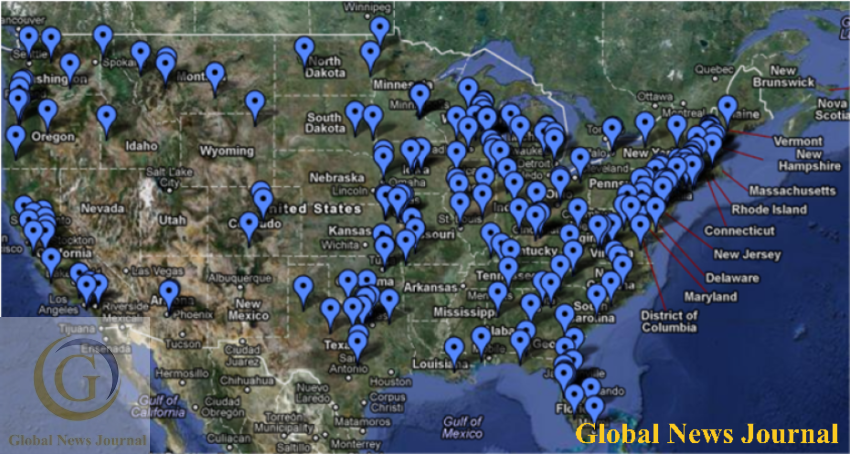The Western North Carolina Disaster: Hurricane Helen Unleashes a Humanitarian Nightmare VIDEO
Ready to uncover the truth? Sick of the lies? Join our Telegram Channel now. It’s time for the real story! My gratitude to all my readers!
A gripping exposé on the humanitarian crisis in Western North Carolina after Hurricane Helen, highlighting the devastation, FEMA’s failures, and the urgent need for action as winter looms.
A Devastating Crisis Unfolds
Western North Carolina is ground zero for one of the most devastating humanitarian crises in recent history. Hurricane Helen tore through the region, leaving behind catastrophic flooding, flattened homes, and lives forever changed. As families struggle to pick up the pieces, they face a dual adversary: the wrath of nature and the cold indifference of federal agencies. Bureaucratic red tape and FEMA’s controversial actions have turned this disaster into an unrelenting nightmare, with no end in sight.
The aftermath of Hurricane Helen has exposed the glaring failures in disaster management and federal response. The residents of Western North Carolina are not just victims of a natural disaster—they are casualties of systemic negligence. The stories from the ground paint a harrowing picture of survival, desperation, and resilience in the face of overwhelming odds.
The Immediate Aftermath: Destruction Beyond Comprehension
Homes Obliterated, Lives Shattered
Hurricane Helen unleashed unparalleled destruction across Western North Carolina, triggering floods of historic proportions. Rivers surged to staggering levels, erasing homes, businesses, and entire communities. Once-stable neighborhoods were transformed into barren wastelands, with nothing left but debris and shattered dreams. Families who once lived in comfort now find themselves without shelter, braving the elements in makeshift tents or temporary shelters cobbled together with the remnants of their former lives.
This destruction isn’t just physical—it’s emotional and psychological. Residents have lost everything: homes, cherished belongings, and the sense of security that grounds daily life. For many, the trauma is compounded by the uncertainty of what comes next. Will help arrive? Or will they be left to fend for themselves in a seemingly forgotten corner of the country?
Volunteer Heroes Step In
While federal aid remains bogged down in bureaucracy, volunteers have stepped into the void, displaying remarkable courage and determination. Among them is Matt McWain, the founder of Operation Hilo, a grassroots effort that has become a lifeline for affected communities. McWain and his team of 200 pilots have mobilized a fleet of helicopters to deliver essential supplies to those stranded in inaccessible areas.
Volunteers have also worked tirelessly to bring temporary housing, using trailers and RVs to offer a modicum of comfort to displaced families. Their efforts are hindered by treacherous terrain and lack of infrastructure, but their determination shines through. These ordinary citizens are doing what the government has failed to do: saving lives and offering hope.
FEMA: A Barrier to Recovery
Blocking Aid and Obstructing Relief
FEMA, the agency tasked with aiding recovery, has instead become an obstacle. Reports from the ground indicate that FEMA has actively blocked the delivery of trailers and other emergency resources. Roads have been closed, and new flood zones designated, cutting off access to critical areas. For residents attempting to rebuild or reach their properties, FEMA has erected gates, turning their own land into inaccessible territory.
This behavior is not just bureaucratic overreach; it’s an affront to the basic human right to recover and rebuild. Every blocked road and closed gate is another blow to families already on the brink of despair.
Draconian Regulations on Temporary Housing
FEMA’s policies have further exacerbated the crisis. Trailers, often the only housing option available, cannot be placed on properties newly designated as flood-prone. This blanket restriction ignores the reality that many of these properties were safe before the hurricane. With the altered topography post-Helen, residents are left with nowhere to place temporary shelters, forcing them into unsustainable living conditions.
The rigidity of these rules demonstrates a shocking lack of empathy and foresight. Instead of adapting to the unique challenges of this disaster, FEMA has chosen to enforce policies that deepen the suffering of already vulnerable communities.
The Terrain: A Daunting Challenge
Western North Carolina’s mountainous landscape presents formidable challenges to recovery efforts. Many affected areas are remote, with narrow, winding roads that are impassable for large vehicles. This terrain has hindered the delivery of aid and the transport of trailers, leaving entire communities cut off from help.
Adding to the complexity is the lack of infrastructure. Essential services like power, water, and sewage systems have been decimated, making it nearly impossible for families to resume any semblance of normal life. Volunteers are doing their best to navigate these obstacles, but without federal support, their efforts are akin to plugging a dam with a single finger.
The Economic Fallout: A Region in Crisis
Local Businesses on the Brink
The disaster has rippled far beyond the immediate devastation, wreaking havoc on the region’s economy. Asheville and surrounding towns, once vibrant hubs for tourism and commerce, are now struggling to survive. Hotels, restaurants, and shops that relied on tourist dollars have seen their customer base evaporate overnight. Closed roads and widespread destruction have deterred visitors, compounding the financial strain.
For small businesses, the situation is dire. Without customers, revenue has dried up. The loss of income has forced many owners to lay off staff, creating a domino effect of hardship that extends to countless families. The economic recovery of Western North Carolina will depend on swift and decisive action—but that action remains elusive.
Federal Funds in Limbo
Adding insult to injury, federal disaster loan funds have dried up. Despite warnings from the Biden Administration that funds would run out by October, Congress has failed to act. These loans are critical for homeowners and businesses to rebuild, yet lawmakers have adjourned for the holidays without addressing this glaring need. The inaction is a slap in the face to those who are fighting for survival.
Life on the Ground: A Daily Struggle for Survival
Families Living in Squalor
The human cost of this disaster is gut-wrenching. Families are living in tents, exposed to the elements and the dangers of the wild. Stories abound of parents and children battling freezing temperatures, wildlife, and hunger. One family, delivered a camper by McWain’s team, had endured a bear attack just days earlier. These are not isolated incidents—they are the grim reality for countless residents.
The lack of adequate housing and resources has turned survival into a daily battle. For these families, every day is a test of endurance, and every night is another chapter in an ongoing nightmare.
Volunteers: The Beacons of Hope
Amid the despair, the dedication of volunteers provides a glimmer of hope. Their efforts to deliver supplies and temporary housing are nothing short of heroic. But even these tireless workers are stretched to their limits. Without meaningful federal intervention, their impact can only go so far. The clock is ticking, and winter’s chill threatens to make a dire situation even worse.
Policy Failures: The Role of Congress and FEMA
Congressional Indifference
The failure of Congress to replenish the U.S. Small Business Administration’s Disaster Loan Fund is a glaring example of governmental negligence. These loans are not a luxury—they are a lifeline. Yet, lawmakers have prioritized their holiday recess over the urgent needs of disaster-stricken communities. This inaction is not just frustrating; it’s deadly.
Calls for Change
While some representatives, like Senator Ted Budd, have made efforts to address the crisis, these actions are isolated and insufficient. Advocates and residents have been vocal in demanding change, but the systemic inertia of Washington, D.C., has proven a formidable barrier. Until federal agencies and lawmakers recognize the gravity of the situation, Western North Carolina will remain in limbo.
A Long Road to Recovery
Parallels to Hurricane Katrina
The scale of destruction and the glacial pace of recovery efforts draw unavoidable comparisons to Hurricane Katrina. Like New Orleans, Western North Carolina faces a years-long battle to rebuild. The scars of this disaster will linger, shaping the region’s future for decades to come.
The Role of Public Awareness
Raising awareness is critical to ensuring Western North Carolina does not become an overlooked tragedy. Media coverage, grassroots campaigns, and community advocacy can shine a spotlight on the urgent need for action. This is not just a local crisis—it’s a national failure that demands accountability.
Conclusion: A Call to Action
The disaster in Western North Carolina is a sobering reminder of the fragility of human life and the glaring flaws in our disaster management systems. The resilience of the affected communities and the dedication of volunteers are inspiring, but they cannot shoulder this burden alone.
Lawmakers and federal agencies must act now. Lives are at stake, and every moment of delay deepens the crisis. Winter is here, and for many, survival depends on immediate and decisive intervention. This is not just a story of tragedy—it’s a call to action for all of us to demand better.
Our mission to champion democracy, freedom of speech, and patriotic values relies on the support of dedicated individuals like you. Your contribution is vital in helping us provide insightful analysis, uncover pressing issues, and inspire positive change in our nation.
Join us in our commitment to making a difference. Every donation counts and empowers us to continue our work in advocating for the values we hold dear.
Thank you for being a crucial part of our journey.

I’m a 33-year-old writer and the founder of World Reports Today. Driven by the timeless principles of democracy and freedom of speech, I use my platform and my writing to amplify the voices of those who uphold these ideals and to spark meaningful conversations about the issues that truly matter.






